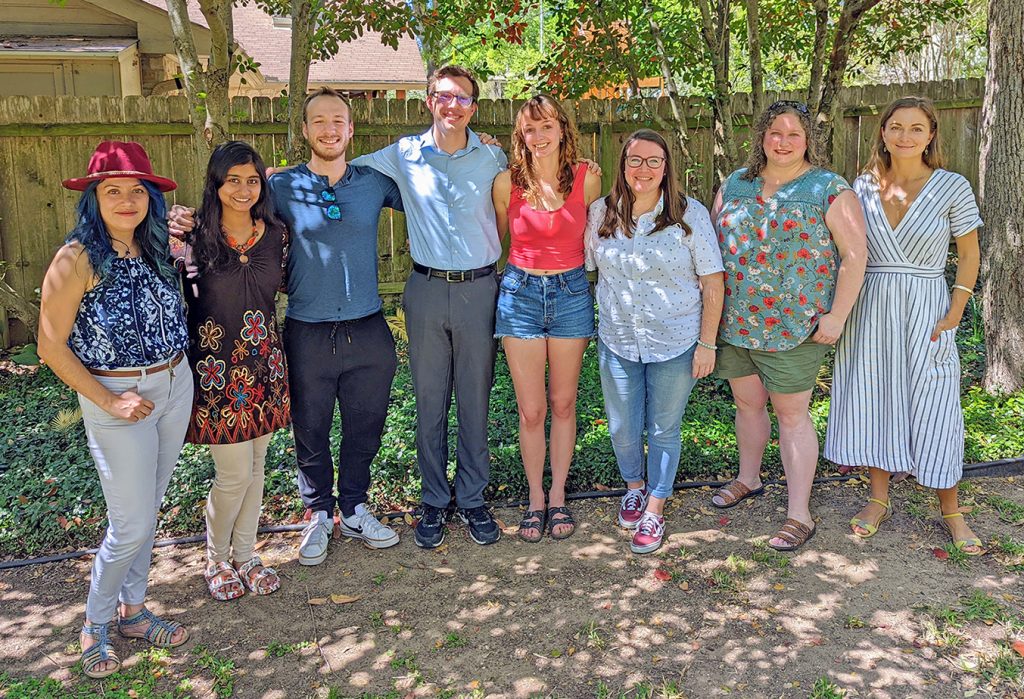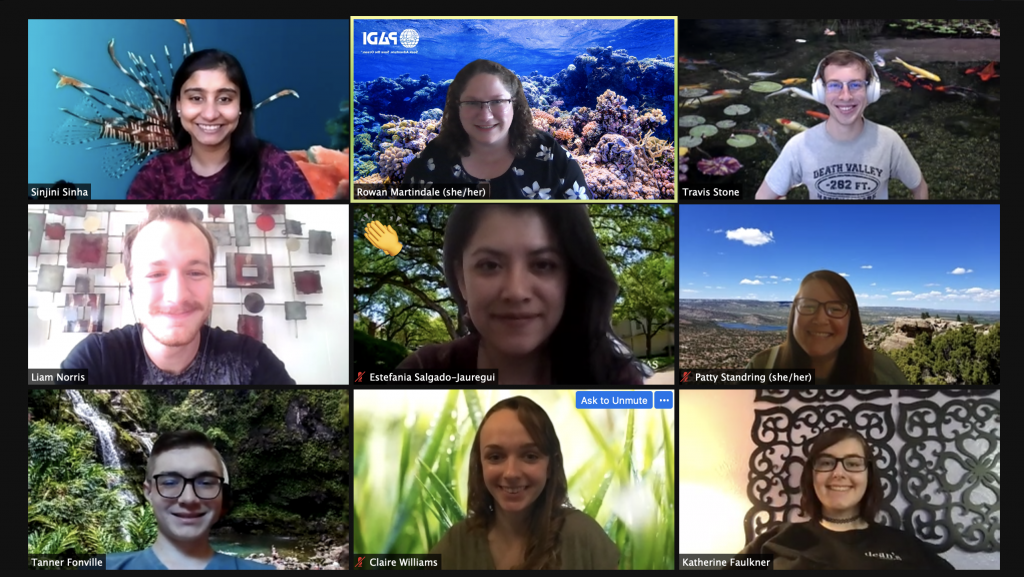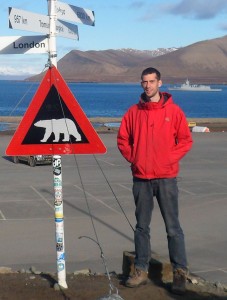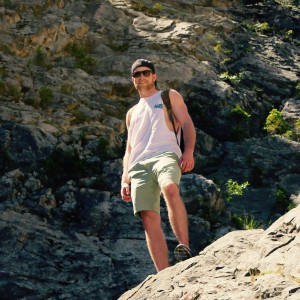People
Principal Investigator
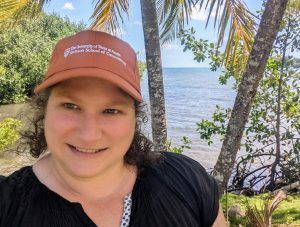
Rowan Martindale is an Associate Professor in the Department of Earth and Planetary Sciences at the Jackson School of Geosciences. Rowan completed her Bachelor’s degree in Geological Sciences (general degree in biology) at Queen’s University (Kingston, Canada) in 2007. In 2012 Rowan completed her Ph.D. with the Bottjer Lab at the University of Southern California (Los Angeles, USA). Rowan joined the Jackson School (Assistant Professor) in 2014 after a two-year postdoctoral fellowship at Harvard University with the Knoll research group studying the Toarcian Ocean Anoxic Event and Paleoproterozoic carbonates. Her research involves both field and lab work, from large scale mapping to thin section analysis of microfossils. Recent research is primarily focused on reef paleoecology, exceptional fossilization of marine communities, and the geobiology of carbon cycle perturbation events (e.g. ocean acidification in deep time). Rowan welcomes the opportunity to develop new projects and collaborations with both researchers and students.
Current Postdoctoral Researchers
Ekaterina (Katya) Larina (2022-2024)
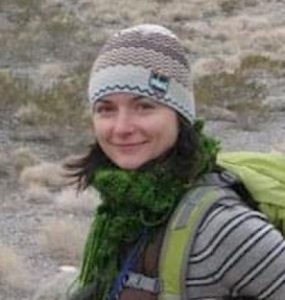 Katya is an interdisciplinary geoscientist who bridges research between paleoecology, geochemistry, geobiology, sedimentology, and earth-system modeling. Specifically, her expertise includes the investigation of the ammonite ecology, the end-Triassic, and the Cretaceous-Paleogene mass extinctions. Katya is interested in ecological and environmental trends during major earth-life perturbation events, and what lessons we can learn to understand the consequences of future warming, ocean acidification, and deoxygenation on marine ecosystems. She received her Ph.D. from the University of Southern California.
Katya is an interdisciplinary geoscientist who bridges research between paleoecology, geochemistry, geobiology, sedimentology, and earth-system modeling. Specifically, her expertise includes the investigation of the ammonite ecology, the end-Triassic, and the Cretaceous-Paleogene mass extinctions. Katya is interested in ecological and environmental trends during major earth-life perturbation events, and what lessons we can learn to understand the consequences of future warming, ocean acidification, and deoxygenation on marine ecosystems. She received her Ph.D. from the University of Southern California.
Current Graduate Students
Sinjini Sinha (PhD, expected 2024)
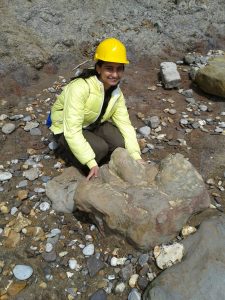
Sinjini Sinha is a Ph.D. candidate at the Jackson School of Geosciences. Sinjini Sinha is a Ph.D. at the Jackson School of Geosciences. Her doctoral research is about assessing the impacts of environmental changes on Early Jurassic exceptional preservation, extinction, and recovery. She uses Scanning Electron Microscopy and Energy Dispersive X-Ray spectroscopy to investigate the taphonomy of Lagerstätten deposits from the UK and Germany. Her extinction and recovery work involves studying the community structure of level-bottom communities from the High Atlas Mountains of Morocco. Her previous research focused on the systematics and paleoecology of Late Cretaceous sharks from central India and southern England as well as on the diversity of early Paleocene bony fishes from western Canada. Sinjini holds a M.Sc. in geology from the University of Delhi in India, a M.Sc. in Systematics and Evolution from the University of Alberta in Canada, and a M.Res. in Vertebrate Palaeontology at the University of Southampton, UK. She is a Commonwealth Scholar and an “On To the Future” alumni. Besides research, she is interested in teaching, conducting outreach, dancing, and traveling.
Travis Stone (PhD, expected 2024)
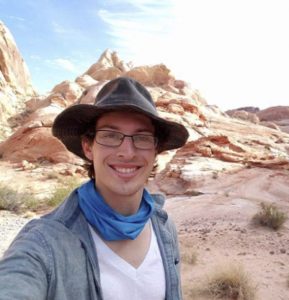
Travis Stone is a Ph.D. candidate working in the Martindale lab. He received his B.S. in Geological Sciences in 2018 from California State University, Fullerton, where he studied Triassic reefs and their recovery following the End-Permian mass extinction in the Panthalassic Ocean. Travis is interested in ecosystem reconstruction following extinction events and other environmental stressors and plans on studying Jurassic reefs in Morocco. He is also passionate about teaching geoscience and has worked on refining his teaching by incorporating various active learning techniques that encourage group learning and collaboration in order to spread scientific concepts to a wide audience. His other interests include landscape photography, steam locomotive operation, and playing the trombone.
Liam Norris (Ph.D., expected 2025)
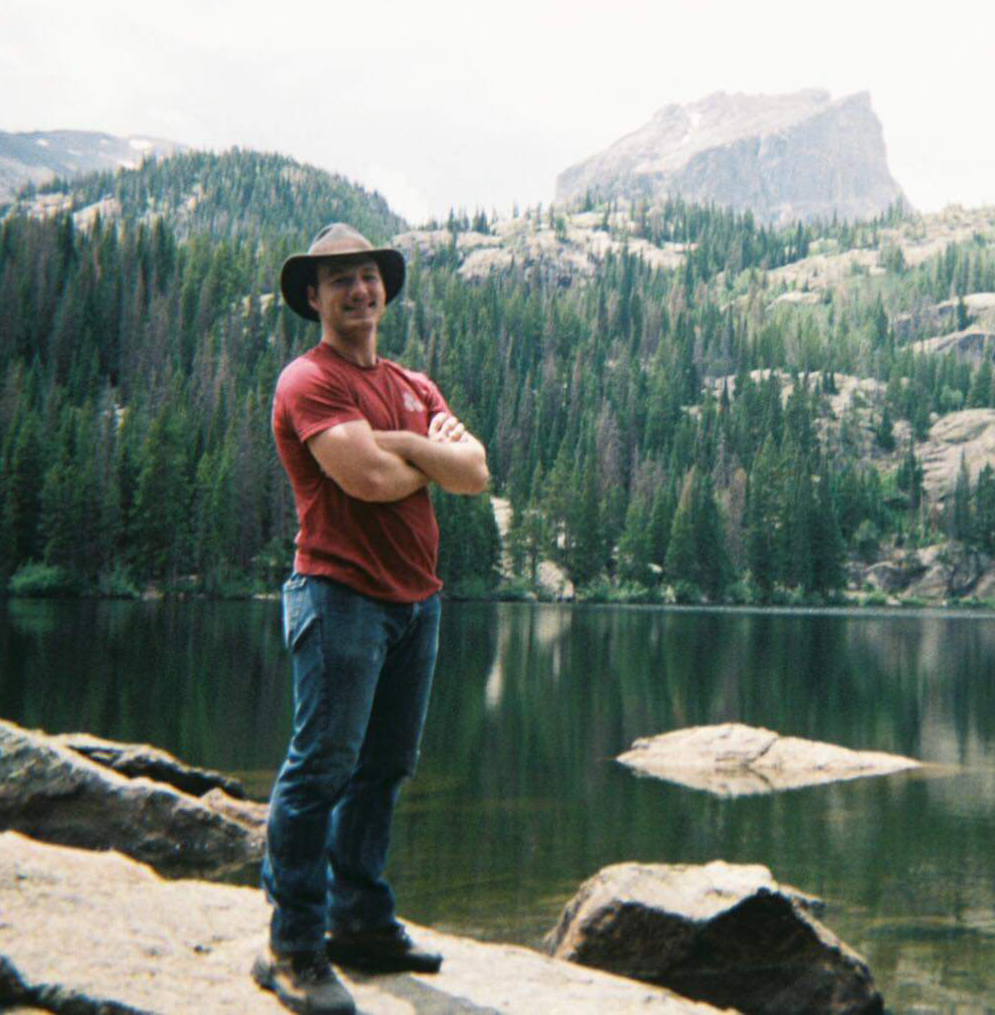 Liam Norris is a Ph.D. student at the Jackson School of Geosciences. He has a B.S. in Geology with a specialization in biology from Texas A&M University, where he also conducted research on Pennsylvanian seed ferns preserved in coal balls. Liam’s research interests are based around paleoecology, and he hopes to further study the connection that ecosystems have with other Earth systems, specifically during extinction events. Liam is also interested in scientific outreach and worked at the Houston Museum of Natural Science where he developed the skills to make science approachable to all people. He believes that all people should be given the chance to understand science and that greater education for all will lead to a healthier society in the future.
Liam Norris is a Ph.D. student at the Jackson School of Geosciences. He has a B.S. in Geology with a specialization in biology from Texas A&M University, where he also conducted research on Pennsylvanian seed ferns preserved in coal balls. Liam’s research interests are based around paleoecology, and he hopes to further study the connection that ecosystems have with other Earth systems, specifically during extinction events. Liam is also interested in scientific outreach and worked at the Houston Museum of Natural Science where he developed the skills to make science approachable to all people. He believes that all people should be given the chance to understand science and that greater education for all will lead to a healthier society in the future.
Patricia (Patty) J. Standring (Ph.D., expected 2025, co-advised by Dr. Chris Lowery)
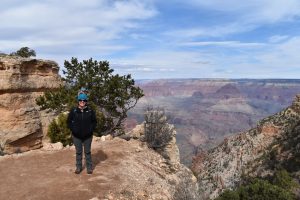 Patty Standring is a Ph.D. student, studying deep ocean current changes in the southern Gulf of Mexico and western Atlantic around the Eocene-Oligocene Transition (EOT) using stable isotopes from benthic foraminifera. She is particularly interested in how deep ocean circulation changed in these regions as the North Atlantic Deep Water developed, and how that may have coincided with benthic extinctions at the EOT. She is a US Air Force veteran and received her undergraduate degree in Geophysics from the University of Texas-Austin in May 2020. During her undergrad she used microfossil analysis to study on Holocene sea level changes off the coast of Galveston Bay, Texas. She hopes to pursue a PhD in paleoceanography after completing her master’s and work for a government agency, conducting research that will inform future policy decisions regarding global climate change.
Patty Standring is a Ph.D. student, studying deep ocean current changes in the southern Gulf of Mexico and western Atlantic around the Eocene-Oligocene Transition (EOT) using stable isotopes from benthic foraminifera. She is particularly interested in how deep ocean circulation changed in these regions as the North Atlantic Deep Water developed, and how that may have coincided with benthic extinctions at the EOT. She is a US Air Force veteran and received her undergraduate degree in Geophysics from the University of Texas-Austin in May 2020. During her undergrad she used microfossil analysis to study on Holocene sea level changes off the coast of Galveston Bay, Texas. She hopes to pursue a PhD in paleoceanography after completing her master’s and work for a government agency, conducting research that will inform future policy decisions regarding global climate change.
Claire Williams (Ph.D., expected 2025)
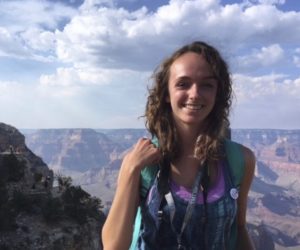 Claire Williams is a Ph.D. student at the Jackson School of Geosciences. She has a B.S. in Geology and in Integrative Biology and a minor in Chemistry from the University of Illinois Urbana-Champaign. She is a biologist turned paleobiologist interested in conservation paleobiology. Besides research, she is interested in outreach, teaching, and reforestation.
Claire Williams is a Ph.D. student at the Jackson School of Geosciences. She has a B.S. in Geology and in Integrative Biology and a minor in Chemistry from the University of Illinois Urbana-Champaign. She is a biologist turned paleobiologist interested in conservation paleobiology. Besides research, she is interested in outreach, teaching, and reforestation.
Current Undergraduate Researchers
Caitlin Currie (BSc, expected 2024)
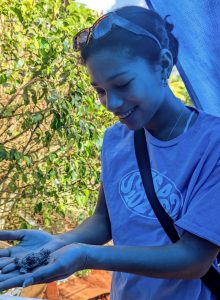
Martindale Lab Alumni
Estefania Salgado-Jauregui (PhD, 2023, co-advised by Dr. Kathy Ellins)
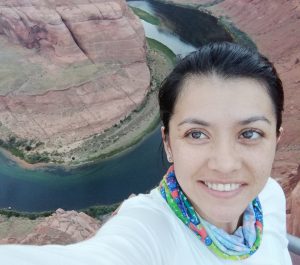
Estefania Salgado-Jauregui was a Fulbright scholar at the Jackson School of Geosciences, co-advised by professors Dr. Rowan Martindale and Dr. Katherine Ellins (Program Director of Geoscience Education Research). Estefania’s research aims to incorporate geoscience education research into geoconservation strategies, she is especially interested in the relationship between nature and society, how place-based education increases ‘sense of place’, and how ‘sense of place’ impacts behaviors and attitudes towards nature. Her study area is East Portland, Jamaica, where she is supporting ongoing conservation strategies to protect coral reefs and their resources. Estefania received her bachelor’s degree in Geology from the National University of Colombia, and she holds a MSc degree in Geology from the same institution. Before staring her PhD, Estefania worked for the Colombian Geological Survey in projects related to geological heritage, including the national inventory of geoheritage sites and the first proposal for a Global UNESCO geopark in the country, El Nevado del Ruiz Volcano Geopark initiative. At JSG Estefania has been involved in leadership positions, as the JSG representative in the UT Graduate Students Assembly; in this respect, she is especially interested in participating in initiatives to increase inclusion in the Geosciences. In her spare time, she enjoys the outdoors, reading poetry, learning history, and cooking.
Katherine Faulkner (BScH, 2023)
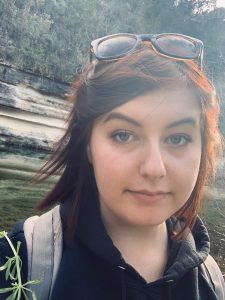 Katherine was an undergraduate Environmental Science major working with a foraminiferal dataset. She studied how these microorganisms have changed over time. She is now working on a Ph.D. at Oxford University with Dr. Erin Saupe.
Katherine was an undergraduate Environmental Science major working with a foraminiferal dataset. She studied how these microorganisms have changed over time. She is now working on a Ph.D. at Oxford University with Dr. Erin Saupe.
Tanner Fonville (BScH, 2022)
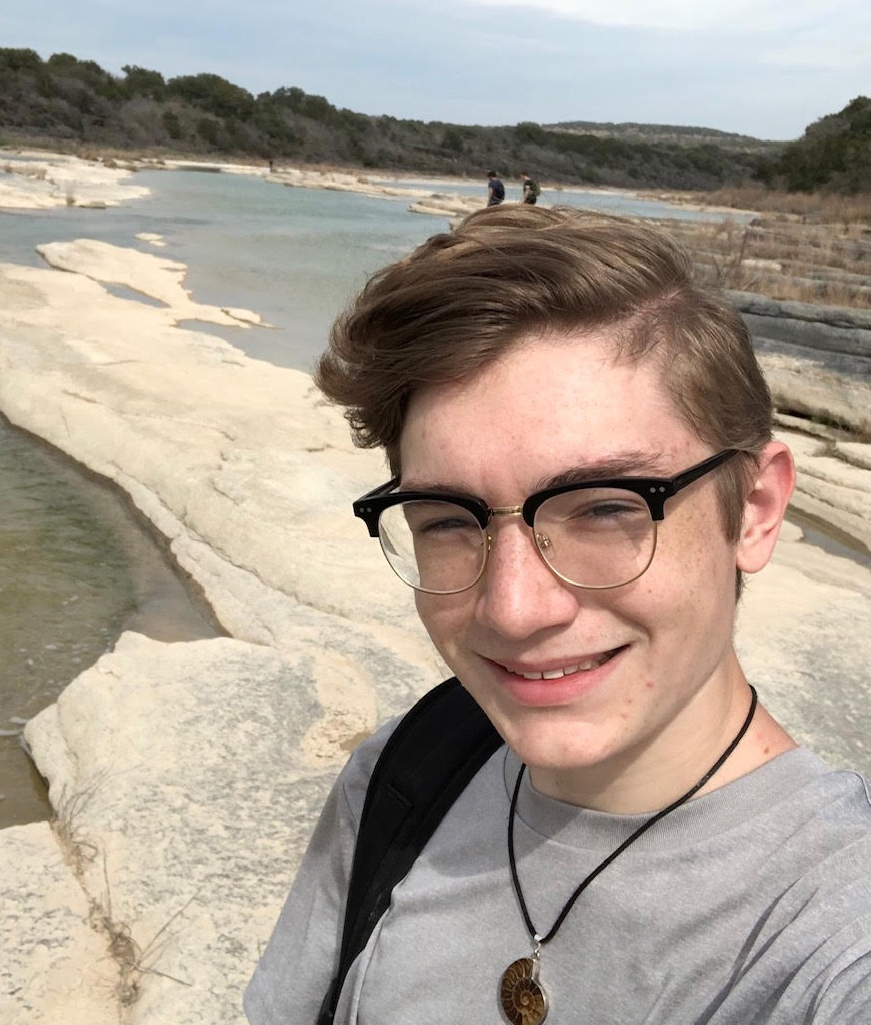 Tanner is an undergraduate General Geology major interested in foraminifera and their recovery following extinction events. He is currently studying foraminifera from Lower Jurassic reefs of Morocco. He has started graduate school at TAMU.
Tanner is an undergraduate General Geology major interested in foraminifera and their recovery following extinction events. He is currently studying foraminifera from Lower Jurassic reefs of Morocco. He has started graduate school at TAMU.
Barbara Sulbaran (BScH, 2022)
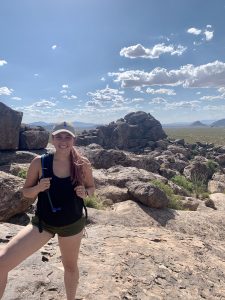 Barbara Sulbaran is an undergraduate General Geology major currently working on her honors thesis. She is interested in geoscience education research. She wants to understand how people learn and understand geoscience concepts and processes through the usage of games and whether or not cultural and experiential backgrounds influence how people learn. In addition, she works in the High-Resolution X-ray Computed Tomography lab helping upload scans to Morphosource, a data archive that allows researchers access to 3D data. She also works for an energy consultancy firm in downtown Austin called Blue Ocean Energy. At UT Barbara has been involved in student organizations with leadership positions. In Texas Spirits she serves as a New Member Mentor and she serves as Social Chair for both GLOW and UGS. In her spare time, she enjoys the outdoors, making art, dancing, and traveling.
Barbara Sulbaran is an undergraduate General Geology major currently working on her honors thesis. She is interested in geoscience education research. She wants to understand how people learn and understand geoscience concepts and processes through the usage of games and whether or not cultural and experiential backgrounds influence how people learn. In addition, she works in the High-Resolution X-ray Computed Tomography lab helping upload scans to Morphosource, a data archive that allows researchers access to 3D data. She also works for an energy consultancy firm in downtown Austin called Blue Ocean Energy. At UT Barbara has been involved in student organizations with leadership positions. In Texas Spirits she serves as a New Member Mentor and she serves as Social Chair for both GLOW and UGS. In her spare time, she enjoys the outdoors, making art, dancing, and traveling.
Ali Alibrahim (2021-2022, co-advised by Dr. Chris Lowery)
Abby Creighton (BSc, expected 2021)
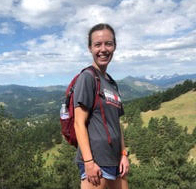 Abby is an undergraduate geology major currently working on understanding the elemental composition and preservation of fossil specimens from Early Jurassic Lagerstätten.
Abby is an undergraduate geology major currently working on understanding the elemental composition and preservation of fossil specimens from Early Jurassic Lagerstätten.
Tyler Logie (BScH, 2021)
Tyler Logie was an undergraduate student and completed his honors thesis in Geology with the Martindale lab. He is now pursuing a Ph.D at Syracuse University.
Rebecca Ryan (BSc, 2020)
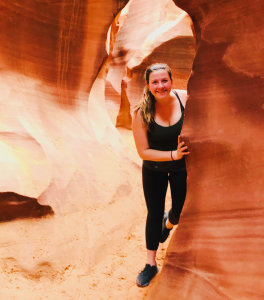 Rebecca Ryan completed an undergraduate degree in Geology. She workedwith Pleistocene reef ecosystem data collected by Dr. Dennis Hubbard and his students. Rebecca’s other interests include marine science, invertebrate paleontology, and climate change throughout geologic time.
Rebecca Ryan completed an undergraduate degree in Geology. She workedwith Pleistocene reef ecosystem data collected by Dr. Dennis Hubbard and his students. Rebecca’s other interests include marine science, invertebrate paleontology, and climate change throughout geologic time.
Brooke Bogan (BSc, 2020)
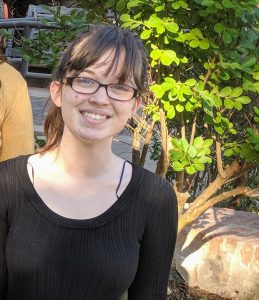
Brooke Bogan completed an undergraduate degree in Geology. She worked on the morphology and taxonomy of Jurassic Lobsters from the Ya Ha Tinda Lagerstätte and has completed an MSc at SUNY Fredonia.
A. Drew Muscente (Postdoctoral Fellow, 2018-2019)
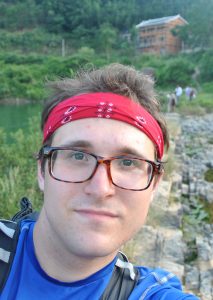
Drew Muscente is now an Assistant Professor at Cornell College. After receiving a B.S. in Biological Sciences from Cornell University, Drew completed his Ph.D. in Geosciences at Virginia Tech, where his work focused on the geomicrobiological processes and paleoenvironments that allow for fossilization of soft and labile tissues. He then spent two years as a postdoc at Harvard, developing and applying computational methods for quantifying changes in ecosystems over the last 580 million years. Drew was a postdoctoral fellow in the Jackson School from 2018-2019 working on the preservation and paleoecology of Jurassic deposits with exceptionally preserved fossils. Overall, his research seeks to improve our understanding of the evolutionary history of marine animals on the community level, from their origin in the Ediacaran to their responses following the radiations, extinctions, and environmental perturbations of the Phanerozoic. His work has been published in PNAS, Precambrian Research, Astrobiology, and various other journals.
Anna M. Weiss (PhD, 2019)
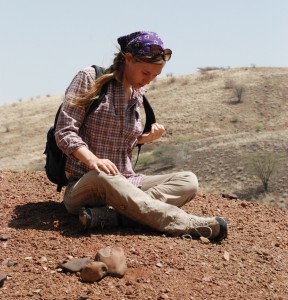
Anna Weiss completed her Ph.D. in Spring 2019; she is now an Assistant Professor at Midwestern State University. Last year she was a Climate Resilience Post-Doctoral Fellow working with Dr. Leandra Cho-Ricketts (University of Belize) and Dr. Justin Ries (Marine Science Center, Northeastern University) at the Environmental Research Institute at the University of Belize. Anna received her undergraduate degree in Anthropology and Geology from Stony Brook University in 2013. Anna’s research interests are broad and include the consequences of climate change for biotic communities, the evolution of keystone species, and the use of databases, statistical analyses, and models in paleoecology. At UT, she focuses on the impacts of temperature, nutrients, and other environmental stressors on corals during a carbon-cycle perturbation event approximately 56 million years ago (the Paleocene-Eocene Thermal Maximum). Anna is also a passionate environmentalist and would like to integrate her work with a growing body of research that aims to better predict and mitigate the effects of climate change on modern coral reefs.
Stacie Skwarcan (PhD, expected 2023)
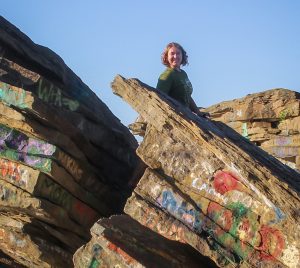 Stacie Skwarcan was co-advised by Drs. Martindale and Banner in her first year but has decided to work on Paleoclimate. She graduated in May 2018 from the University of Notre Dame with a Bachelors’ degrees in Environmental Earth Science and Studio Art with an emphasis in Photography. Stacie is interested in combining aspects of paleontology and paleoclimatology to investigate how organisms have reacted to past changes in climate with the hope that this will aid in the understanding of how they might react to anthropogenic climate change. In her spare time, Stacie enjoys nature photography and videography.
Stacie Skwarcan was co-advised by Drs. Martindale and Banner in her first year but has decided to work on Paleoclimate. She graduated in May 2018 from the University of Notre Dame with a Bachelors’ degrees in Environmental Earth Science and Studio Art with an emphasis in Photography. Stacie is interested in combining aspects of paleontology and paleoclimatology to investigate how organisms have reacted to past changes in climate with the hope that this will aid in the understanding of how they might react to anthropogenic climate change. In her spare time, Stacie enjoys nature photography and videography.
Sean Kacur (BSc Honors, 2019)
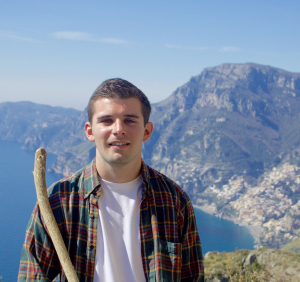 Sean Kacur was an undergraduate student studying Geology and English; he is originally from Vienna, Virginia. For his undergraduate thesis he constructed a geochemical record of Lower Jurassic carbonate systems, focusing specifically on the use of strontium isotopes to better understand the Toarcian Ocean Anoxic Event. Sean also worked as a lab tech in the Banner and Lassiter clean isotope labs. His other geological interests include soils and their interaction with a changing environment.
Sean Kacur was an undergraduate student studying Geology and English; he is originally from Vienna, Virginia. For his undergraduate thesis he constructed a geochemical record of Lower Jurassic carbonate systems, focusing specifically on the use of strontium isotopes to better understand the Toarcian Ocean Anoxic Event. Sean also worked as a lab tech in the Banner and Lassiter clean isotope labs. His other geological interests include soils and their interaction with a changing environment.
Jordan Oefinger (BSc, 2018)
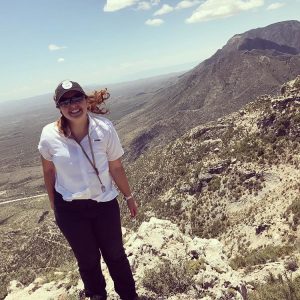 Jordan Oefinger received her Bachelor’s degree in Geology from The University of Texas in 2018. Her undergraduate research was focused on looking at carbonate rocks with a preserved boundary representing the Paleocene-Eocene Thermal Maximum to quantify a possible shallow platform ocean acidification event. Her research interests include carbonate and clastic sedimentology, geochemistry, and invertebrate paleontology. Jordan will be attending the University of Arkansas where she will be working towards a Master’s degree in clastic stratigraphy under the supervision of Dr. Glenn Sharman.
Jordan Oefinger received her Bachelor’s degree in Geology from The University of Texas in 2018. Her undergraduate research was focused on looking at carbonate rocks with a preserved boundary representing the Paleocene-Eocene Thermal Maximum to quantify a possible shallow platform ocean acidification event. Her research interests include carbonate and clastic sedimentology, geochemistry, and invertebrate paleontology. Jordan will be attending the University of Arkansas where she will be working towards a Master’s degree in clastic stratigraphy under the supervision of Dr. Glenn Sharman.
Mackenzie White (BSc, 2017)
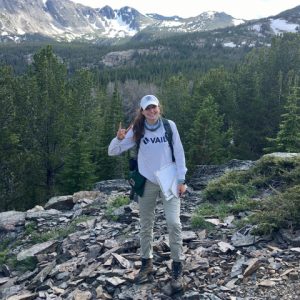 Mackenzie got her Bachelor’s Degree in 2017 in Geology and Plan II Honors. Her undergraduate thesis focused on the surface morphology of martian debris-covered glaciers and their potential as climate change indicators. At UT, her research focuses include planetary sciences, climate change, and invertebrate paleontology. Mackenzie plans to pursue a joint JD/PhD program to follow her interest in the intersection of science and public policy. In addition to research, Mackenzie enjoys skiing and hiking with her dog, Rocky.
Mackenzie got her Bachelor’s Degree in 2017 in Geology and Plan II Honors. Her undergraduate thesis focused on the surface morphology of martian debris-covered glaciers and their potential as climate change indicators. At UT, her research focuses include planetary sciences, climate change, and invertebrate paleontology. Mackenzie plans to pursue a joint JD/PhD program to follow her interest in the intersection of science and public policy. In addition to research, Mackenzie enjoys skiing and hiking with her dog, Rocky.
William Foster (Postdoctoral Fellow 2015-2017)
William Foster was a distinguished postdoctoral fellow in the Jackson School of Geosciences; he is now an Assistant Professor in Paleobiology at the University College Dublin, Ireland. William received his PhD from Plymouth University, UK, and an integrated Masters from the University of Hull, UK; he was also a Geo.X Young Academy Fellow in Berlin from 2017-2019.
William is a paleoecologist primarily interested in the recovery of marine invertebrates following the late Permian mass extinction event. His research focuses on how subsequent environmental change following the late Permian mass extinction led to shifts in the recovery of the benthos and if wave-aerated settings provided a ‘habitable zone’ allowing diverse benthic life to survive and recover following major climate warming. With the Martindale lab, he worked on the relationship between the distribution of benthic invertebrates and microbialites.
Nicholas Ettinger (MSc 2017)
Nick Ettinger got his Master’s degree working jointly in the Martindale and Kerans labs; he comes from an undergraduate degree in Geological Sciences at Queen’s University, in Central Canada. His research interests and background are in carbonate sedimentology/invertebrate paleontology and petroleum geology. Nick’s research focused on Lower Jurassic carbonate systems and the sedimentological and paleontological transitions across the Toarcian Ocean Anoxic Event. Through this research, Nick hopes to gain an appreciation for how contemporary alterations to ocean chemistry might affect marine ecosystems and to provide insight into conjugate margins where Lower Jurassic carbonates are an important component of petroleum systems.
Kelly Hattori (MSc 2017)
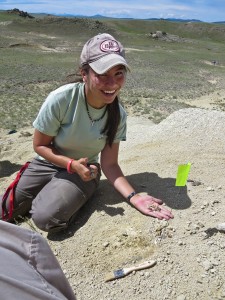
Kelly Hattori got her Master’s degree working jointly in the Martindale and Kerans labs. She obtained her undergraduate degrees in Geology and Marine Biology from the University of North Carolina Wilmington. Her research interests range broadly and include Mesozoic coral reef paleoecology, Pleistocene mollusk paleoecology, Eocene lacustrine taphonomy, and digitization techniques for museum collections. Her work at UT focused on coral reef paleoecology and transitions in reef community composition in a changing ocean environment. Kelly intends to add her data sets to those obtained from modern coral reefs in order to gain a broader understanding of the effects of a changing global climate upon reef communities.
Outside of paleontology, Kelly enjoys traveling, SCUBA diving, and working on cars. She is now working for the BEG.
Hanna M. Brame (2016-2017)
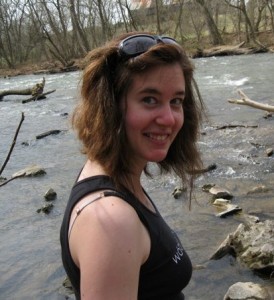
Hannah Brame was a PhD student in the Martindale lab but decided not to continue her degree for personal reasons. Hannah received her Bachelor’s degree (2011) and Master’s degree (2013) in geological sciences from Ohio University in Athens, Ohio, where she also contributed to a NSF-funded Paleo-niches museum digitization project. Her research interests include paleoecology (including ecological niche modeling), paleobiogeography and museum collection digitization. Hannah is also an enthusiastic STEM science educator who hopes to increase scientific literacy through community and K-12 outreach.
Maria Reistroffer (BSc 2017)
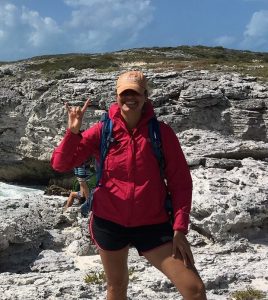
Maria Reistroffer earned her Bachelor’s degree in Geology from The University of Texas in 2017. Her undergraduate thesis focused on testing for evidence of ocean acidification in marine fossils and the timing of events across the latest Permian extinction event. Her research interests include carbonate sedimentology, invertebrate paleontology, and reservoir characterization. Maria now attends Oklahoma State University where she will be working on her Master’s degree in carbonate geology under the supervision of Dr. Grammer. Outside the realm of geology, Maria enjoys hiking, swimming, traveling, and playing volleyball.
Walker Wiese (BSc 2017)
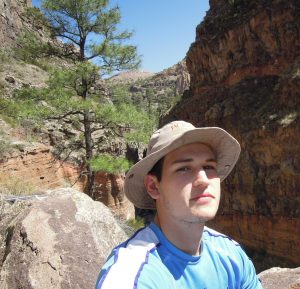
Walker Wiese got his Bachelor’s Degree in 2017 in Geology, History, and Plan II Honors. Walker did his undergraduate honors thesis in the Martindale Lab with a focus on discussing modern coral threats with a recent and deep time perspective. He built a database of Caribbean Acropora, Montastraea, and Diploria corals, and mapped coral percent cover changes across the Caribbean region during Pleistocene-Holocene sea-level highs. Along with his research of corals, Walker is an avid scuba diver and has taught diving and marine conservation in the Caribbean, Hawaii, and Madagascar.
Selva Marroquín (MSc 2016)
Selva Marroquín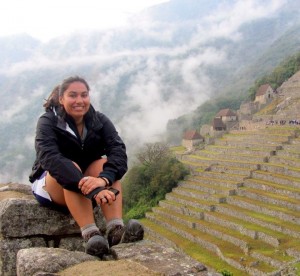 completed her MSc at UT Austin in 2016 (Bachelor of Science degree in Geological Sciences from Tufts University in 2014) and Ph.D. at Virginia Tech (check out her website here: https://smmarroquin.com/). Her MSc research focused on an Early-Jurassic Lagerstätte from Alberta that contains the Toarcian Ocean Anoxic Event and preserves the soft tissue of squid. The squid collected from this site are some of the only specimens to have been found outside of Europe for this time period. Selva enjoys traveling and hopes that one day she will be able to complete research in Latin America.
completed her MSc at UT Austin in 2016 (Bachelor of Science degree in Geological Sciences from Tufts University in 2014) and Ph.D. at Virginia Tech (check out her website here: https://smmarroquin.com/). Her MSc research focused on an Early-Jurassic Lagerstätte from Alberta that contains the Toarcian Ocean Anoxic Event and preserves the soft tissue of squid. The squid collected from this site are some of the only specimens to have been found outside of Europe for this time period. Selva enjoys traveling and hopes that one day she will be able to complete research in Latin America.
She is currently a Postdoc at CalTech.
Chiara Tornabene (MSc 2016)
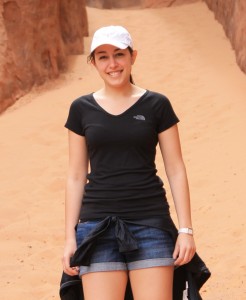 Chiara Tornabene got her Master’s degree in 2016 (Bachelor’s degree from the University of Mary Washington in 2014 in Geology and Classical Civilizations). Chiara’s MSc research aimed to determine novel proxies to test for photosymbiosis in Mesozoic corals. She experimented with stable isotope geochemistry for signals of seasonal variability in coral growth bands as well as other new techniques for determining if corals had symbionts.
Chiara Tornabene got her Master’s degree in 2016 (Bachelor’s degree from the University of Mary Washington in 2014 in Geology and Classical Civilizations). Chiara’s MSc research aimed to determine novel proxies to test for photosymbiosis in Mesozoic corals. She experimented with stable isotope geochemistry for signals of seasonal variability in coral growth bands as well as other new techniques for determining if corals had symbionts.


